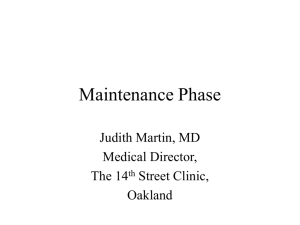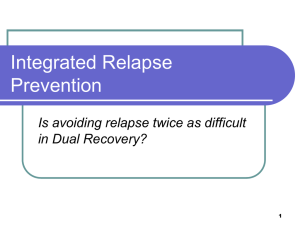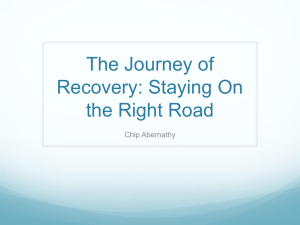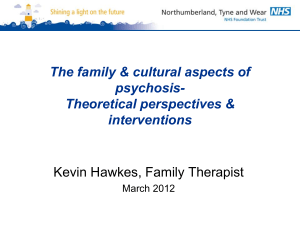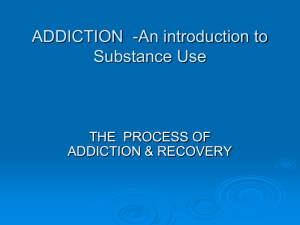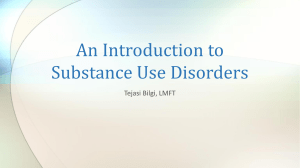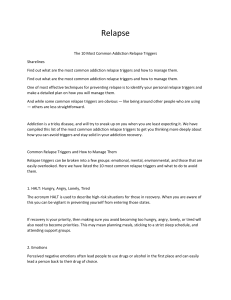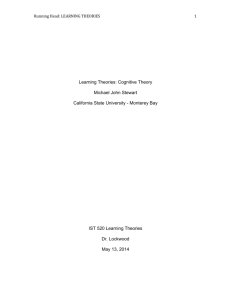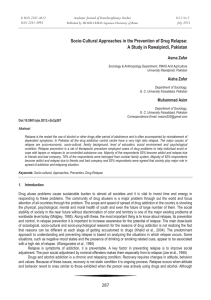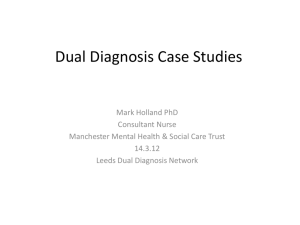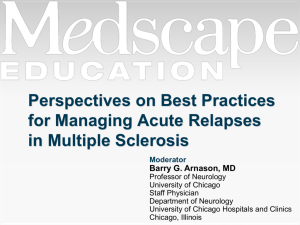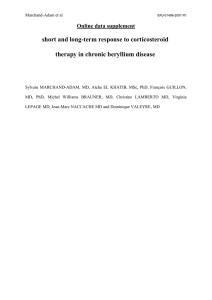Answer Key Pre-post for all separate
advertisement
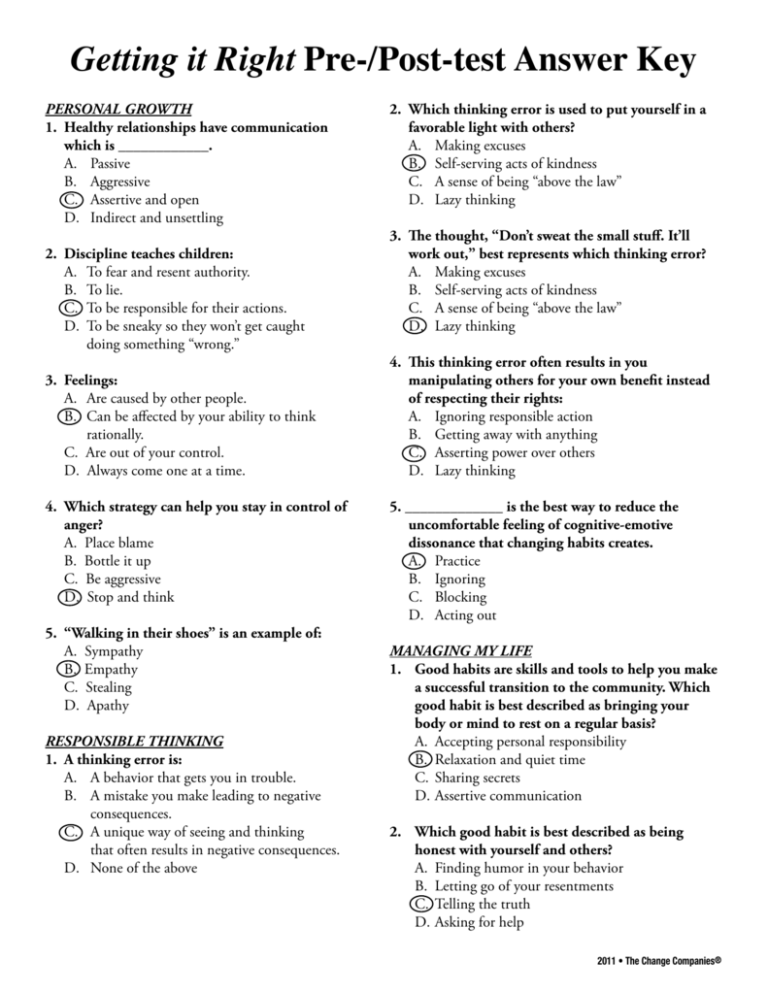
Getting it Right Pre-/Post-test Answer Key PERSONAL GROWTH 1. Healthy relationships have communication which is ____________. A.Passive B.Aggressive C. Assertive and open D. Indirect and unsettling 2. Discipline teaches children: A. To fear and resent authority. B. To lie. C. To be responsible for their actions. D. To be sneaky so they won’t get caught doing something “wrong.” 3.Feelings: A. Are caused by other people. B. Can be affected by your ability to think rationally. C. Are out of your control. D. Always come one at a time. 4. Which strategy can help you stay in control of anger? A. Place blame B. Bottle it up C. Be aggressive D. Stop and think 5. “Walking in their shoes” is an example of: A. Sympathy B. Empathy C. Stealing D. Apathy RESPONSIBLE THINKING 1. A thinking error is: A. A behavior that gets you in trouble. B. A mistake you make leading to negative consequences. C. A unique way of seeing and thinking that often results in negative consequences. D. None of the above 2. Which thinking error is used to put yourself in a favorable light with others? A. Making excuses B. Self-serving acts of kindness C. A sense of being “above the law” D. Lazy thinking 3. The thought, “Don’t sweat the small stuff. It’ll work out,” best represents which thinking error? A. Making excuses B. Self-serving acts of kindness C. A sense of being “above the law” D. Lazy thinking 4. This thinking error often results in you manipulating others for your own benefit instead of respecting their rights: A. Ignoring responsible action B. Getting away with anything C. Asserting power over others D. Lazy thinking 5. _____________ is the best way to reduce the uncomfortable feeling of cognitive-emotive dissonance that changing habits creates. A.Practice B.Ignoring C.Blocking D. Acting out MANAGING MY LIFE 1. Good habits are skills and tools to help you make a successful transition to the community. Which good habit is best described as bringing your body or mind to rest on a regular basis? A. Accepting personal responsibility B. Relaxation and quiet time C. Sharing secrets D.Assertive communication 2. Which good habit is best described as being honest with yourself and others? A. Finding humor in your behavior B. Letting go of your resentments C. Telling the truth D.Asking for help 2011 • The Change Companies® 3. A _________job is one you can get immediately to begin covering your financial responsibilities. A.Survival B. Entry level C. Advanced level D.Career 5. The behavior, “I begin to hang out with people who act irresponsibly” is a… A. Positive activity. B. Relapse warning sign. C. Roadmap for success. D.Step in the right direction. 4. “Staying away from slippery people and places” is what type of skill? A.Stress-reduction B. Alcohol and drug refusal C. Accepting feedback D.Decision-making CHANGE PLAN 1. “Starting to think about negative consequences that irresponsible and criminal behaviors have had on your life” is an example of: A. Preparation Stage B. Contemplation Stage C. Precontemplation Stage D. Action Stage 5. “Not making hurtful or sarcastic remarks” is what type of skill? A.Relationship-building B.Decision-making C. Anger management D.Accepting feedback RELAPSE PREVENTION 1. The process of trying to stop the return of behaviors you attempted to quit is called: A. Relapse prevention B. Cognitive restructuring C.Backsliding D.Case planning 2. Which step is not part of creating “mental movies” to practice responsible thinking and behavior? A. Begin by relaxing B. Read a warning sign – identify your irrational thoughts C. Tell yourself it’s OK to lapse just this one time D.Replace irrational thinking with positive self-talk E. Replay and adjust your mental movie 3. Relapse is ___________: A.Unavoidable B.Preventable C. An event D.A condition of probation 4. Which of the following statements is most accurate concerning relapse? A. Relapse occurs after a single event. B. Relapse prevention is easy. C. Relapse cannot be reversed. D.A lapse is not a relapse. 2. Raising ______ is part of being in the Contemplation Stage. A. Cain B. Concern C. Consideration D.Children 3. An essential part of the Preparation Stage is to set goals that you will begin to go after. These goals should be: A. Simple, maintainable, aggressive and telling B. Long-term with the bar set high C. General, flexible and easy D.Specific, measurable, achievable, rewarding and trackable 4. It is important to maintain _________ in your life in an attempt to remain crime-free. A.Business B. Balance C. Chaos D.Tunnel vision 5. “You’ve been living crime-free for more than six months and are leading a healthier, more responsible life” is an example which stage? A. Action Stage B. Contemplation Stage C. Complacency Stage D.Maintenance Stage 2011 • The Change Companies®
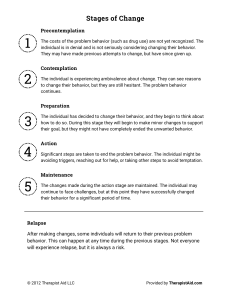
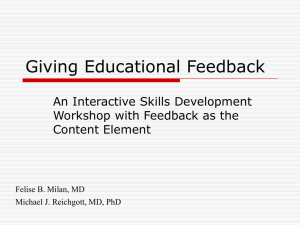
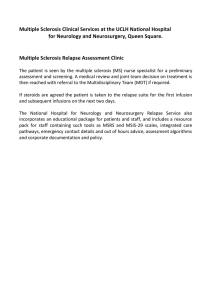
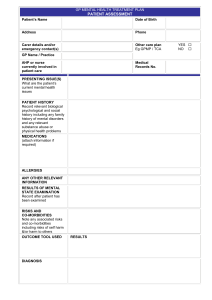
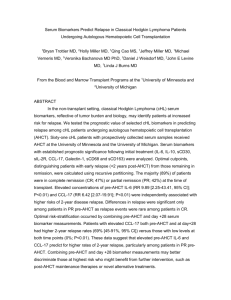
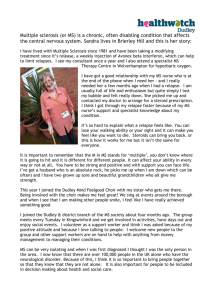
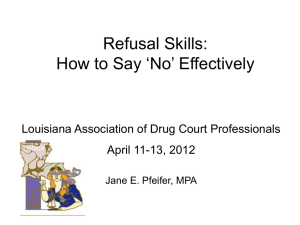
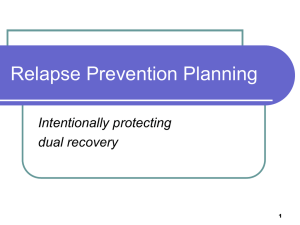
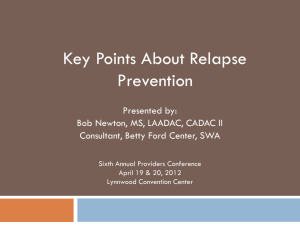
![Name: Date: Wordpieces 3.3 Practice [8th] Complete the sentence in](http://s2.studylib.net/store/data/009837596_1-224a630730d63f8a5c6dcb7a5256a0a0-300x300.png)
